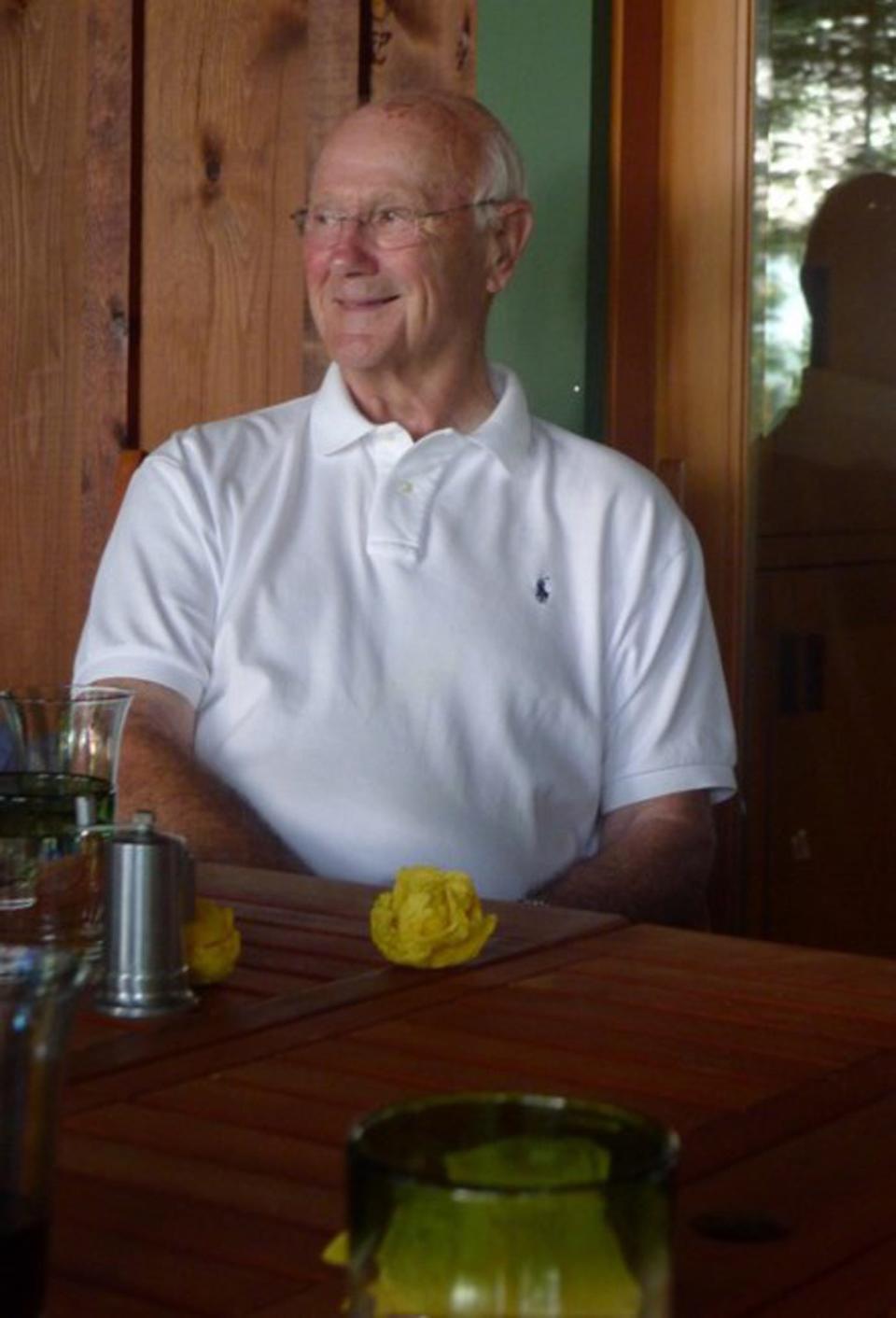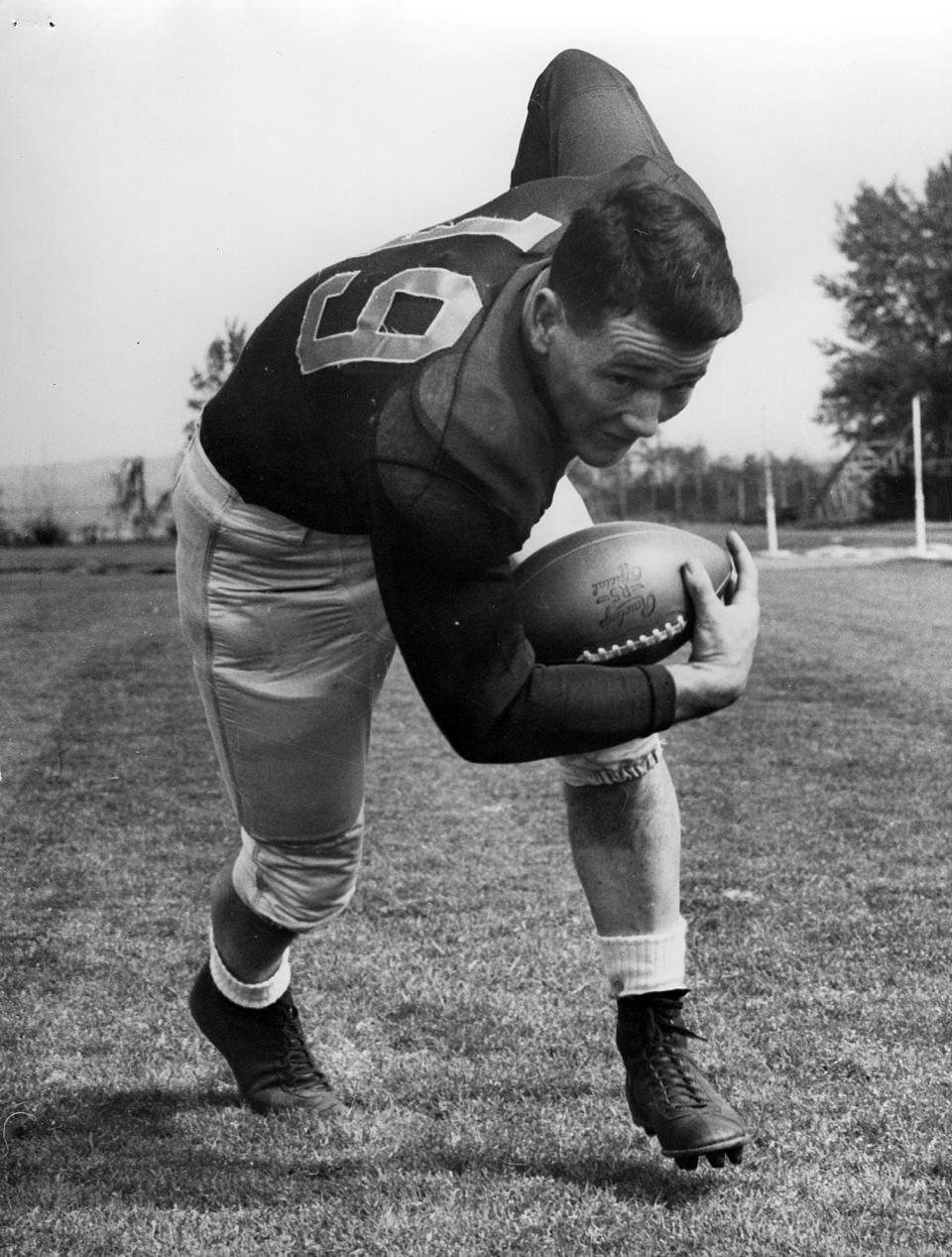Saying goodbye to Jim Wiley, a West High football legend
One of the nice guys — and it can be argued Jim Wiley was among the nicest of his era — left the planet July 31, after giving 93 good years to us here on Earth. His departure definitely left a hole to fill.
Wiley was born in Port Angeles, raised in Bremerton and spent much of his youth playing sports at Warren Avenue Playfield like many of the legendary athletes of his day did, including teammate Don Heinrich.
Wiley developed into a tremendous running back at Bremerton High School and led the state in scoring his senior season (1947) with 16 touchdowns and 1,031 rushing yards. The Wildcats completed an undefeated season (12-0) by beating Ballard 19-14 in the Turkey Day game that decided state supremacy. Wiley was the team captain, made the All-State team and played in the high school all-state game. The 1947 team was inducted into the Kitsap Sports Hall of Fame in 2006, and Wiley as an individual in 2008.

Those who met Wiley had the good fortune to see how nice people act. In the obituary for Wiley, it was stated he “Gave an outstretched hand, a warm smile, and twinkling grey eyes greeted all who approached. Jim took the measure of people by the caliber of their response to his genuine openness.”
Bob Evans, who lives in Hansville, was a classmate, and although not a close friend has never forgotten one memory of Wiley. Evans was at a teen hangout at Dan’s Drive-in, just across the Manette Bridge, one night when a known bully pulled his neck under his arm and started pounding on him.
“There was a little fight going on, which happened often,” Evans recalled. “Several people were involved. One of the tough guys was beating on me. Jim Wiley came around, looked at him and said 'That’s enough,' and it was over. Pretty much everybody had respect for Jim and his toughness.”
Bob Slonecker was the football team manager and had a close-up view of Wiley, who he thinks the world of to this day.
“Jim was one of my favorite guys,” says Slonecker, who lives in Dallas, where he was a professor for the Richland Campus of Dallas College. “He was just a good human being, and not like most football players. He was always helping people. Nobody could compare to Wiley. He was outstanding as an individual and as a ball player.
“He was just a great person. I have been around a lot of people being in education, but I would put Jim right up there at the top end.”
No question Wiley was a key component of the Bremerton football team. He may have been one of the nicest guys one could meet, but on the football field you didn’t want to meet him as an opponent.
“He was one hellevua football player,” says Evans. “He was a central player on the football team. He told me many years later at a Husky football game that the most fun he had playing football was at Bremerton. He was a fine man and was the kind of guy who was in on most plays.”

Wiley accepted a football scholarship to the University of Washington along with four teammates — Bud Olson, Heinrich, Harry Johnson and Gordon Personius. He played for the Huskies from 1949-51 and was named the Guy Flaherty Award winner in 1951 as the most inspirational.
“The guy Flaherty Award is UW’s oldest and most prestigious football award, first given in 1908 to the team’s most inspirational player, as voted by the players,” says Jeff Bechtold, Assistant Athletic Director for Athletic Communication at UW.
Winning the Flaherty Award was a no-brainer because Wiley could not help but be inspirational. He was constructed that way from birth.
“A lot of people picked on us,” says Slonecker of his team managing days. “Jim would not allow it to happen. He would pat us on the back and say, ‘You are doing a good job.’ He did that to everybody – just a positive person. Of all the people in my life I would have to rank him as one of the best I have met.”
Bremerton in that time frame was fortunate because it had another athlete a lot like Wiley. That would be Gale Wade, who graduated in 1947, one year before Wiley, and also was a running back.
“My father chased happy most of his life,” says son Michael Wade. “He had a relentless curiosity and met people very easily because he was interested in them and they could feel that. He engaged people the same way and it didn’t matter if they were a prince or a pauper.”
One of the things that most people did not know was Wiley was told he couldn’t play football after he lost a kidney his junior year playing football. He bruised the kidney in a game his junior year and then it became infected. It had to be removed. The doctor that did the surgery told him no more football.
Well, that didn’t stop him. His best performances on the football field came a year later. And he not only finished out high school playing the sport, he played four years at Washington. He played both ways – halfback and linebacker – and earned all-Coast linebacker his last two years.
It was Bob Fredericks, longtime sports figure in Bremerton and a founder of the Kitsap Tennis and Athletic Center, that got Wiley playing tennis.
“I taught him to play tennis in high school,’ says Fredericks. “He was pretty good, actually.”
Like football, tennis became a passion for Wiley, as did golf.
He met his wife Lela “Lee” Wiley at a Bremerton restaurant owned by her father and they married in 1958. She was at his side when he passed at their Washington D.C apartment.
According to his obituary, Wiley developed value of teamwork, discipline and compassion playing football that helped him throughout his life, including serving with the U.S. Coast Guard.
After the Coast Guard, Wiley went back to the University of Washington as assistant athletic director, working primarily with the football program.
Wiley then went to work for the King County Housing Authority and was its executive director from 1973 to 1997, developing numerous programs recognized nationally for innovation that are still being used today.
When he retired Wiley moved to the Minneapolis area to be near his daughter Janice’s family. He took special interest in his grandson, James, who played football in high school.
His football passion thus came full circle. He will be remembered for being not just a good football player, but for being a great human being who brought love and kindness with him as he walked along the pathway of life.
Wiley’s kind will be greatly missed.
Terry Mosher writes a regular column for the Kitsap Sun on local sports personalities. Contact him at bigmosher@msn.com.
This article originally appeared on Kitsap Sun: Saying goodbye to Jim Wiley, a West High football legend
